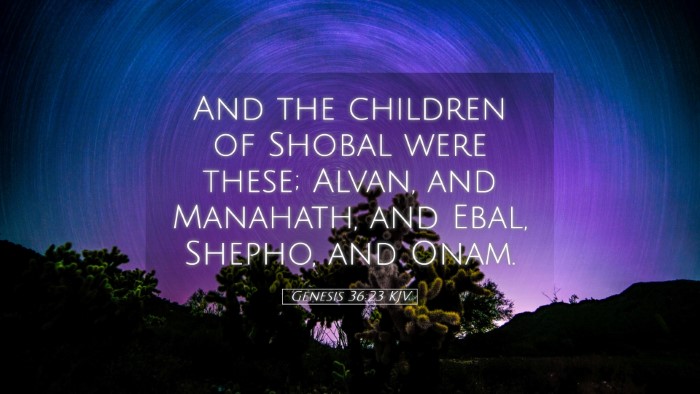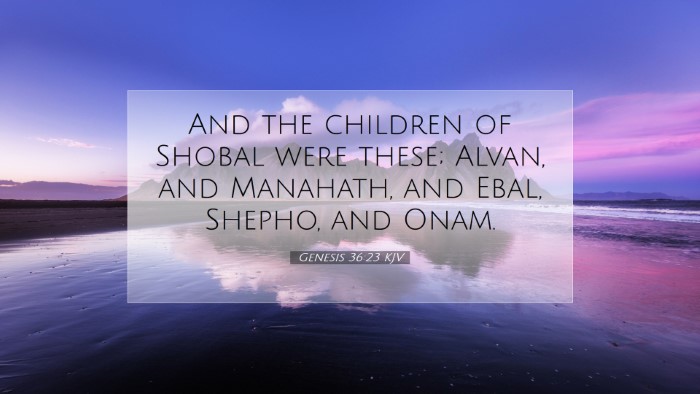Commentary on Genesis 36:23
Genesis 36:23 reads: “And the children of Dishan were Hemdan, and Eshban, and Ithran, and Cheran.” This verse appears in a genealogical context and is part of the wider narrative concerning the descendants of Esau, the patriarch of the Edomites. The naming of Esau's descendants, including this verse, serves both historical and theological purposes, underscoring the fulfillment of God’s promise to Abraham and the unfolding of His divine plan.
Contextual Insights
This passage forms part of the record of Esau's lineage, delineating his family and the nations that sprang from him. Throughout Genesis, genealogical records carry significant weight, reflecting the importance of familial lineage and inheritance in the ancient Near Eastern context. As noted by Matthew Henry, these genealogies serve to affirm God’s promise of numerous descendants to Abraham, Isaac, and Jacob. They also highlight God's sovereignty over history as He orchestrates the births and lives of individuals in fulfilling His covenant.
Interpretation of Key Names
The names mentioned—Hemdan, Eshban, Ithran, and Cheran—may not be elaborated upon in the text, yet they encapsulate the identities and roles within the Edomite lineage. Adam Clarke points out that the significance of these names can be interpreted as indications of particular traits or achievements of these individuals. The Hebrew meanings of names often reflect aspects of their character or notable events associated with them. While the history of these specific children may be less documented, their listing emphasizes the continuation of Esau's lineage, which is pivotal in understanding the dynamics between Israel and Edom.
Theological Reflections
The verse carries theological implications regarding God's providence and the unfolding of His redemptive history. Albert Barnes remarks that the cataloguing of names not only serves genealogical purposes but depicts God's faithfulness in maintaining His covenant with Jacob and his descendants. Furthermore, it illustrates how God often achieves His purposes through ordinary historical developments, encapsulated in the everyday lives of individuals and families.
Divine Sovereignty and Human History
This verse, part of a broader narrative, points towards the complexities of divine sovereignty over human history. While the focus here is on Esau’s descendants, it foreshadows the relationships between Israel and Edom that will play out through Scripture. The tension witnessed later between Jacob and Esau, their respective tribes, and nations, reveals the conflicts that arise when God's chosen interact with those outside the covenant community.
Lessons for Today
- Family Legacy and Heritage: This verse highlights the importance of family and heritage in understanding one's identity in Christ. For pastors and students, emphasizing the role of legacy in shaping faith and community can foster a greater appreciation of God’s plan.
- God's Faithfulness: The genealogical listing serves as a testament to God’s unwavering faithfulness. Even within genealogies, believers can find assurance that God’s promises endure across generations.
- Understanding Conflicts: The historical tension between Edom and Israel invites profound reflection on contemporary conflicts. An acknowledgment of these ancient disputes can lead to deeper insights about reconciliation, forgiveness, and the importance of blessing those who were once enemies.
Conclusion
Genesis 36:23, though it might appear as a mere listing of names, encapsulates rich theological truths that resonate through the entire biblical narrative. The descendants of Esau, especially those mentioned herein, contribute to the intricate tapestry of God’s redemptive plan. For pastors, students, and scholars alike, the gleaning from this verse provides an invitation to delve deeper into understanding God's work through history and the importance of every name that has come to represent a part of His divine purpose.


